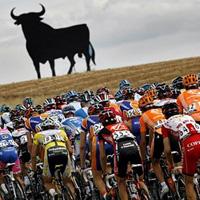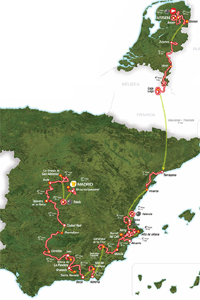
Recently on Cyclingnews.com |
Cycling News Flash, December 17, 2008Edited by Gregor Brown Vuelta 2009: Easy start, tough endingBy Bjorn Haake
Race organisers Unipublic and ASO presented today in Madrid a 2009 Vuelta a España that will kick off outside of Spain for the first time since 1997. From the start in Assen, Netherlands, to the finale on the famed Paseo del Prado in Madrid the riders face 3279 kilometres. There will be five mountain top finishes in the three-week race, held from August 29 to September 20. "It's the most international Vuelta ever. It has all of the elements necessary to provide a great race," Javier Guillen to the International Herald Tribune. He is the new race director, taking over for Victor Cordero stepped down last year. The race will start out with a 4.5-kilometre time trial on the motorbike race track in Assen. Two more stages will follow in the Netherlands, before the race heads into Belgium, via Germany. The fourth stage will be the longest of the Vuelta, at 223 kilometres, and will finish in Liège, Belgium. The first rest day is early to allow the entire Vuelta caravan to travel to its native Spain. The race will resume in Tarragona, Catalunya, where the peloton will find the first two mountains of some significance (Fatxas and Benifallet). The Vuelta heads down the coast – mostly via a transfer – to Xátiva, near Valencia. In Valencia, the first real test takes place, a 30-kilometre individual time trial. Its finish will be on the Formula 1 race track of Valencia and thus slightly resemble the opening day.
Unlike the opening time trial, the first individual time trial is no longer followed by flat stages. It is time for the first real mountain stages. Back to back mountain top finishes in Aitana and Xorret del Catí will start clearing up the overall situation. A short breather in Murcia will be followed by another mountain stage, to Caravaca de la Cruz. Thursday, September 10, the second rest day will give the riders needed recovery time. The riders will need the break, as no less than three mountain top finishes follow in sequence. Stage 12 will end on the Alto de Velefique (1,840m), stage 13 on the Sierra Nevada (2.520m) and stage 14 on the Sierra de la Pandera (1,840m). A few flat stages will follow, giving the riders who have survived the mountains a bit of rest. The stage to Córdoba connects the route to the region of Castilla-La Mancha. It isn't until stage 18 from Talavera de la Reina to Ávila, when the race will end its lull and tackle a category three, two category two and a category one climb. Stage 19 is even worse, with no flat parts on the saw-blade like profile. After that Madrid is quite near, with only 26 kilometres in time trialling left to do. The the penultimate day will have its start and finish in Toledo and is slightly equal to the finishing kilometres where Paolo Bettini won one of his last races as a professional. This time trial will decide the 2009 Vuelta winner, who can then parade into Madrid's Paseo del Prado on September 20 with the jersey oro. A balanced routeEzequiel Mosquera was overall satisfied with the route. He admitted there were a few surprises and put his hopes to the second part of the race. "That will be quite a spectacle," Mosquera said. He will especially look forward to the three mountain top finishes in a row. It was a little too early to predict something for the overall, but Mosquera imagined it would be a bit like this year. "Contador is the main favourite." Contador will be the favourite if he even rides the Tour de France. He will fully concentrate on the Tour in 2009, but indicated that if he hasn't run out of steam, he may once again take part in his home race. He was at the presentation, along with Carlos Sastre, Samuel Sánchez and Alejandro Valverde. All of those have to be counted among the top favourites for 2009, should they decide to race. But what does a domestique say to the route presented? José Luis Arrieta rated especially the second half of the race as very tough. "But overall I like the route that was chosen." (All rights reserved/Copyright Future Publishing (Overseas) Limited 2008) |


